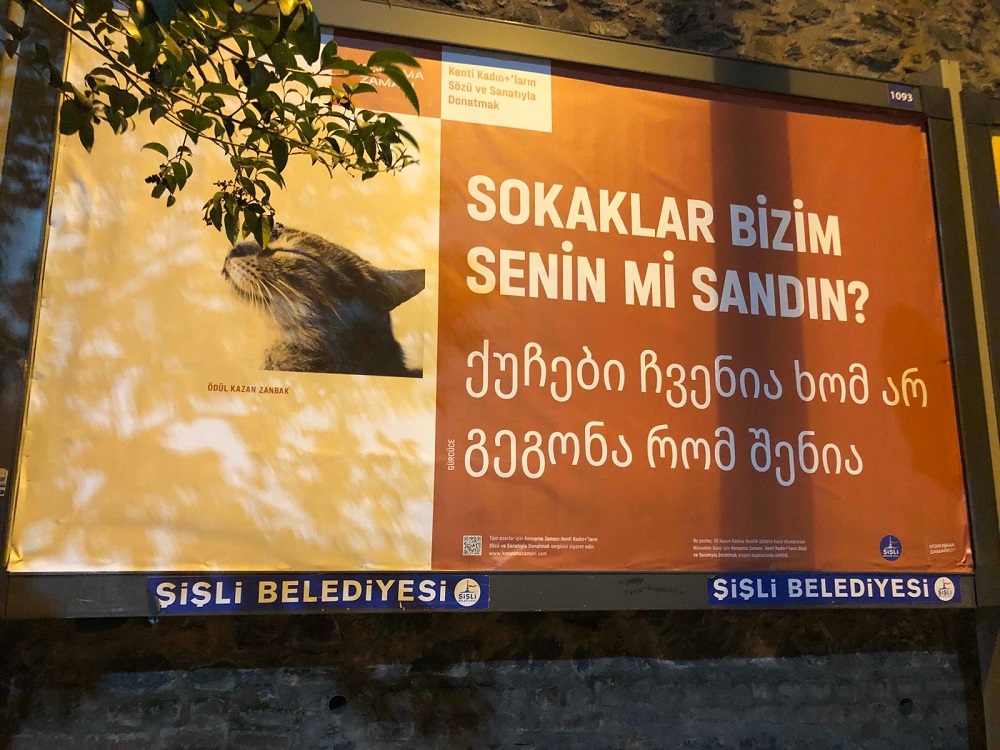Time to Speak, Fill the Walls with Words from Women+

‘Konuşma Zamanı: Kenti Kadın+’ların Sözü ve Sanatıyla Donatmak’ (Time to Speak: Filling the City with the Word and Art of Women+) project makes the slogans that contain equality, justice, right to life, ethical approaches, freedom demands and defend vested rights once again visible in the public arena.
We talked to Meral Akkent, Şehlem Kaçar, Merve S. Öztürk and Burcu Yılmaz about their work called ‘Konuşma Zamanı’ (Time to Speak), which they carried out for the right of women and LGBTI+ people to live freely. The project team describes Konuşma Zamanı as ‘a dialogue project’. The team describes the starting phase of the project with these words: ‘The violence we have heard, witnessed, intervened or experienced in the home, school, street, workplace, in short, everywhere in recent years has made us do this project. We have addressed the issue of gender-based violence, especially in the context of feminist slogans. We aimed to emphasize the vital importance of the Istanbul Convention for women and LGBTI+ individuals, and we wanted to try this time with other methods to say, “Istanbul Convention keeps alive”, which we shouted in unison in the squares.’
‘The State is Obligated to Prevent Male Violence’
Expressing that violence against women continues exponentially every day, the Time to Speak team says that the source of violence is gender inequality and calls on the state to take action: ‘The state is responsible for preventing male violence, developing protective measures, and establishing post-violence support mechanisms. Effective investigations and prosecutions should be carried out, the perpetrators should be punished, and they should form the basis of a fair approach that we cannot see in the judiciary. In other words, the state should take measures to eliminate gender inequality, which is the source of violence. Therefore, withdrawing from the Istanbul Convention, which states the mandatory obligations of states so that women and LGBTI+ people can live free from violence, means that the state does not want to take these obligations seriously. In short, together with millions of people in Turkey, we do not accept the exit from the Istanbul Convention with a decision at midnight!’
The team organized a special study for the International Day for the Elimination of Violence Against Women, November25. They describe the content and purpose of the study titled ‘Konuşma Zamanı: Kenti Kadın+’ların Sözü ve Sanatıyla Donatmak’ as follows: ‘Konuşma Zamanı: Kenti Kadın+’ların Sözü ve Sanatıyla Donatmak project once again makes the slogans of equality, justice, right to life, ethical approaches, freedom demands and defending vested rights visible in the public arena. In the study, the slogans of the feminist movement were interpreted by amateur or professional women+ artists. These works are displayed on billboards and meet the visitors in the virtual exhibition that can be visited on the website in Turkish and English language options. A book with the same name has also been published.’
‘Our Voice Finds a Place in The Public Space’
Expressing that the most important part of the work’s message is language, the Konuşma Zamanı team says: ‘If the language is more male dominated, the public spaces will be more patriarchal. By displaying feminist slogans that interfere with language on billboards, our voice, our word, our demands, our concerns, our hopes, our provocative ideas and our art find a place in the public sphere.’
Konuşma Zamanı emphasizes the place of graffiti in the feminist struggle, while saying that their actions will also be described as billboard activism: ‘Graffiti has been a method used by feminists since the 70s. Women, who were excluded from the public sphere in cities, adopted a method of being visible in the public area, expressing themselves, that is, transforming the public area, with slogans and demands written with chalk or spray, using the walls of the city. In this project, we encounter the same slogans in advertising channels, aka billboards. As a matter of fact, the feminist movement is no stranger to these media, billboard activism is one of the creative activist strategies of feminist artists, as cited in Tuğba Taş’s article for the exhibition. With Taş’s on-the-spot determination, billboard activism “detaches products from galleries and museums and carries them into the social arena and can strongly express the demand for transformation in this area”.’
The project includes billboards as well as a virtual exhibition and book work. The team describes the virtual exhibition and book work with these words: ‘The virtual exhibition includes humorous, angry, sarcastic, demanding and daring works of 57 artists and brief information about the artists. In addition, there is a puzzle section under the title of “Interactive” where everyone can test their knowledge about feminist slogans and have a lot of fun. We had a lot of fun while doing it. Since the “Konuşma Zamanı” project is also a cultural activism work, we also included three short articles describing the basis of the project. Tuğba Taş reflects on feminism, activism and art and examines the exhibition “Konuşma Zamanı”. Seda Yavuz discusses why art is monopolized by one gender. Demet Sayınta reminds us of the history and importance of the 25 November International Day for the Elimination of Violence Against Women.’
‘18 Mother Tongues Spoken in Turkey Are Included in The Project’
Konuşma Zamanı team explains that they followed two methods in the project which are inclusivity and feminism: ‘The feminist method of the project helped us to be sensitive in choosing artists. With this method, the artist selection process was carried out with great care, being aware of the multiple identity characteristics of the open call applicants. We have participants of different ages, from 76 to 16 years old. Features such as ethnic, religious, and cultural background diversity, mother tongue, gender to which the individual feels oneself, disability, immigration, and living area were especially taken into consideration in the selection of the artists to participate in the project. The inclusive method of the project, on the other hand, was carried out by designing the study as multilingual. The artists first chose a slogan from the pool of feminist slogans prepared by the project team. In addition to the Turkish slogan they chose, we encouraged them to choose one of their mother tongues spoken in Turkey. Thus, the posters on the billboards, the virtual exhibition and the book featured 18 mother tongues spoken in Turkey. Feminist slogans were interpreted through artistic works and translated into different languages. As a result, a project that made different interventions to the language, which is a male-dominated field in both interpretation and translation processes, was realized.’
They Tried to Censor Our Project
Although the project team progressed very happily during the production process, they explain that they encountered problems during the implementation phase. The biggest of these problems was experienced with the foundation of the Istanbul Women’s Museum, with which they cooperated: ‘The work we started with the Istanbul Women’s Museum was tried to be censored by the foundation to which the museum is affiliated. Meral Akkent, the curator of the Istanbul Women’s Museum, did not accept these interventions and broke off her relations with the foundation and the museum. Due to the Foundation’s intervention in the content and the feminist methods of the work, the ‘Konuşma Zamanı work was completed by the project team and with the contribution of Aramızda. We think that this censorship intervention of the foundation had a negative impact on the municipal meetings. We talked to 8 municipalities in this project. One municipality decided to issue 40 billboards, the other wanted to participate in the project with 6 billboards. Preliminary meetings were held with 3 municipalities whose billboard numbers were not finalized. After examining the poster designs, the municipalities reported that the works could not be included “due to occupancy”.
We would like to say here that we have been in correspondence with Istanbul Metropolitan Municipality and Izmir Municipality for a long time. Currently, only Şişli Municipality and Tunceli Municipality are participating in the Billboard action. Due to the climate of fear prevailing in the country and the elections approaching, we think that the cancellations are censorship practices. This censorship is likely due to the native languages and the rainbow flag on the posters, although this is not explicitly stated. It is very meaningful for us to continue on the road with the artists and the same team.’
‘Konuşma Zamanı’ Book is Coming on December 15
The ‘Konuşma Zamanı’ book will be published on December 15 and will be delivered free of charge to university libraries, artists participating in the project, and rights-oriented NGOs. At the same date, the PDF version of the book can be downloaded free of charge from the project’s website.
Visual description: Streets are ours, you thought they were yours?

Bizi Takip Edin